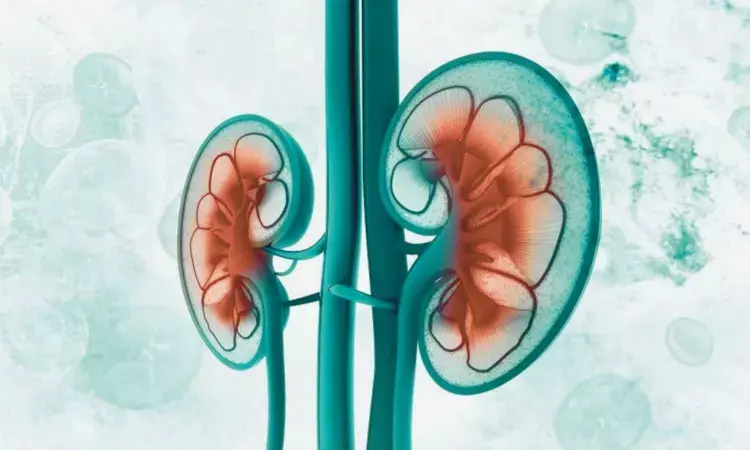- Home
- Medical news & Guidelines
- Anesthesiology
- Cardiology and CTVS
- Critical Care
- Dentistry
- Dermatology
- Diabetes and Endocrinology
- ENT
- Gastroenterology
- Medicine
- Nephrology
- Neurology
- Obstretics-Gynaecology
- Oncology
- Ophthalmology
- Orthopaedics
- Pediatrics-Neonatology
- Psychiatry
- Pulmonology
- Radiology
- Surgery
- Urology
- Laboratory Medicine
- Diet
- Nursing
- Paramedical
- Physiotherapy
- Health news
- Fact Check
- Bone Health Fact Check
- Brain Health Fact Check
- Cancer Related Fact Check
- Child Care Fact Check
- Dental and oral health fact check
- Diabetes and metabolic health fact check
- Diet and Nutrition Fact Check
- Eye and ENT Care Fact Check
- Fitness fact check
- Gut health fact check
- Heart health fact check
- Kidney health fact check
- Medical education fact check
- Men's health fact check
- Respiratory fact check
- Skin and hair care fact check
- Vaccine and Immunization fact check
- Women's health fact check
- AYUSH
- State News
- Andaman and Nicobar Islands
- Andhra Pradesh
- Arunachal Pradesh
- Assam
- Bihar
- Chandigarh
- Chattisgarh
- Dadra and Nagar Haveli
- Daman and Diu
- Delhi
- Goa
- Gujarat
- Haryana
- Himachal Pradesh
- Jammu & Kashmir
- Jharkhand
- Karnataka
- Kerala
- Ladakh
- Lakshadweep
- Madhya Pradesh
- Maharashtra
- Manipur
- Meghalaya
- Mizoram
- Nagaland
- Odisha
- Puducherry
- Punjab
- Rajasthan
- Sikkim
- Tamil Nadu
- Telangana
- Tripura
- Uttar Pradesh
- Uttrakhand
- West Bengal
- Medical Education
- Industry
Baseline Kidney Function Predicts Mortality in Crush Syndrome Post-Earthquake: Study

Researchers have found in a new study that pre-earthquake kidney function is a significant predictor of mortality in patients with crush syndrome, emphasizing the need for baseline renal assessment as part of disaster preparedness and emergency medical planning.
The study published in BMC Nephrology sheds light on the critical role of pre-disaster kidney function in determining survival outcomes for patients with earthquake-related crush syndrome. Conducted by Dr. Ramazan Daniş and colleagues from Gazi Yasargil Educational Research Hospital in Diyarbakır, Türkiye, the research focused on victims of the devastating February 2023 Kahramanmaraş earthquakes.
The study aimed to assess whether kidney function before the earthquake could serve as a reliable predictor of in-hospital mortality among those affected by crush syndrome, a serious condition caused by prolonged compression of muscles, often leading to acute kidney injury (AKI).
Using a multi-center, retrospective design, the researchers evaluated medical records from 469 patients across 46 nephrology clinics. Information on kidney function before the earthquake—measured through serum creatinine and estimated glomerular filtration rate (eGFR)—was retrieved from existing health records. Additional clinical and laboratory parameters, including complications and survival data, were also analyzed. Multivariate Cox regression was used to identify factors independently linked to patient mortality.
The study revealed the following findings:
- The in-hospital mortality rate among patients with crush syndrome was 2.8%.
- Non-survivors had significantly higher pre-earthquake serum creatinine levels (1.04 mg/dL) compared to survivors (0.77 mg/dL).
- eGFR values were considerably lower in non-survivors (85.2 mL/min/1.73 m²) than in survivors (115.8 mL/min/1.73 m²).
- A higher incidence of acute kidney injury (AKI) was observed in non-survivors (92.3%) compared to survivors (61.6%).
- Non-survivors exhibited more severe electrolyte imbalances, including elevated potassium levels (hyperkalemia).
- Elevated pre-earthquake creatinine levels were strongly associated with an increased risk of mortality.
- Multivariate analysis identified pre-disaster creatinine levels (HR: 9.121) and potassium levels at admission (HR: 3.338) as independent predictors of in-hospital death.
- Creatinine levels recorded at hospital admission were not independently associated with mortality.
- Higher creatinine levels from one year before the earthquake likely indicated chronic kidney impairment.
- Individuals with pre-existing reduced kidney function may have lower physiological resilience, increasing their vulnerability during severe traumatic events.
The authors emphasized that these findings highlight the importance of incorporating kidney health assessments into disaster preparedness plans. Identifying individuals with compromised renal function beforehand could enable more targeted interventions and improve survival outcomes in disaster scenarios.
"Overall, the study adds a new dimension to emergency response planning by underscoring the prognostic value of baseline kidney function in patients exposed to severe trauma such as crush injuries," the authors concluded. "It calls for proactive screening and medical readiness that accounts for pre-existing health vulnerabilities, particularly in regions prone to natural disasters."
Reference:
Daniş, R., Öztürk, S., Koçyiğit, İ. et al. Pre-earthquake kidney function is a predictor of outcomes in earthquake-related crush syndrome. BMC Nephrol 26, 284 (2025). https://doi.org/10.1186/s12882-025-04183-3
Dr Kamal Kant Kohli-MBBS, DTCD- a chest specialist with more than 30 years of practice and a flair for writing clinical articles, Dr Kamal Kant Kohli joined Medical Dialogues as a Chief Editor of Medical News. Besides writing articles, as an editor, he proofreads and verifies all the medical content published on Medical Dialogues including those coming from journals, studies,medical conferences,guidelines etc. Email: drkohli@medicaldialogues.in. Contact no. 011-43720751


